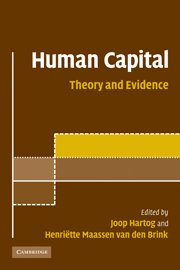Book contents
Epilogue: some reflections on educational policies
Published online by Cambridge University Press: 22 September 2009
Summary
Roughly speaking, some 20% of all government spending in western countries is on education. Western countries are increasingly aware that a well-educated labour force is essential for maintaining standards of living and to compete in global markets. Within the EU, the Lisbon Declaration, with its emphasis on education and training, has become a mantra for politicians and policy-makers. Can they learn something from this book?
As we have documented extensively, education has substantial returns, both privately and socially. The cross-section average returns to a year of education are, internationally, between 5 and 15%. Even in a job that does not fully utilize an individual's education, with returns lower than in the perfect match, they are still substantial. Moreover, mismatches are often temporary and seldom last for an entire working life. The return to education for entrepreneurs, rarely estimated before, is in the high end of the interval, at an average of approximately 14%. Investments in education are important for maintaining one's health. Indicative calculations suggest that these effects are substantial, bringing an additional benefit of 15–60% of the wage return to education. Even offspring benefit, as more educated parents have more successful children.
We have shown good reasons to doubt that the routinely estimated returns to schooling are truly causal effects for an average individual. They are usually measured in a cross-section of different cohorts of individuals, instead of during an individual's working life. Other factors, such as motivation and ability, play a role.
- Type
- Chapter
- Information
- Human CapitalAdvances in Theory and Evidence, pp. 233 - 235Publisher: Cambridge University PressPrint publication year: 2007
- 2
- Cited by



